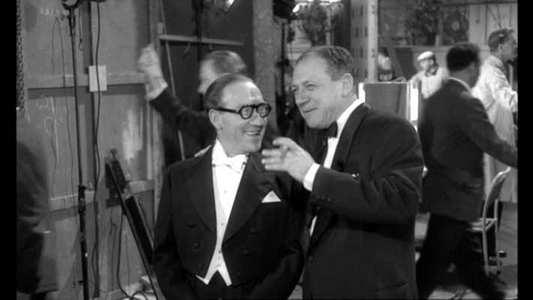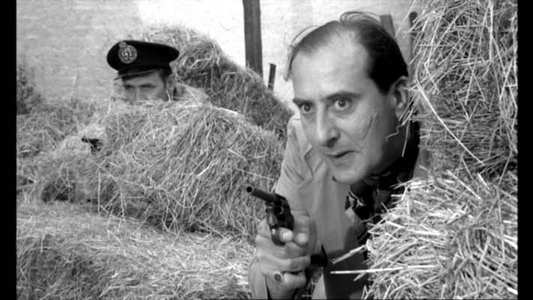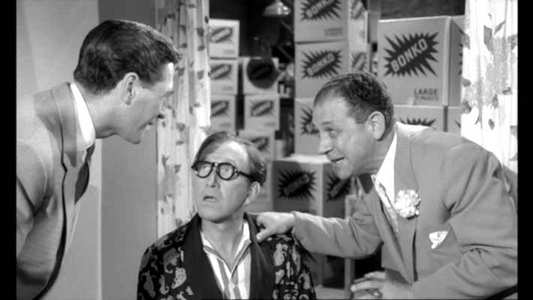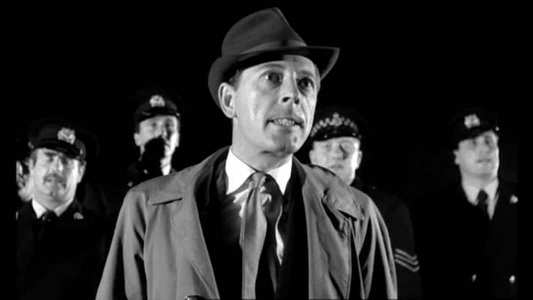Review of Sid James Collection
Introduction
The name Sid James conjures up an image of a dirty old man with a lived in face, always trying to get into Barbara Windsor`s… good graces, and possessing the filthiest laugh in cinema. Well, for a rare few it brings back memories of The Shamen and Ebeneezer Goode, but that`s neither here nor there. While today Sid James is synonymous with the Carry On films that he is an integral part of, there were many more strings to his bow than just the seaside postcard romps that he is best remembered for. His first Carry On film came in 1960, after 13 years in the film business, and he had serious roles in films like Trapeze and Hell Drivers, as well as being Tony Hancock`s long suffering sidekick in the radio and television series. Still, the majority of his cinema work was in comedy, and Optimum gather three such non-Carry On films featuring Sid James together in this collection.
Travelling backwards in time, we begin with the 1965 film…
The Big Job
George Brain is the head of a gang that has planned a perfect heist. Unfortunately the gang is mostly incompetent, so of course the plan goes wrong. Running from the police, George manages to find an old but memorable tree in the middle of the countryside, with a convenient hole in which to stash their ill-gotten gains. Fifteen years later when they are released from the Scrubs, all that`s left is to find the tree and retrieve the loot. The first piece of bad news is that where the green countryside used to be, there now is a shiny new town, the second is that the tree still survives, but is almost inaccessible behind a massive wall, the capper is that the tree is now in the back yard of the local police station. Still, George is nothing if not persistent, so he, his gang, and his girlfriend Myrtle take lodgings in a house opposite the station from which to devise their plans.
Make Mine A Million (1959)
Arthur Ashton is a make up artist for the National Television service, making sure that its pantheon of stars looks their best for the camera. He has ambitions of bigger and better things though, and finds the station`s output dull and elitist. His problems begin when he meets street hawker Sidney Gibson. Gibson is trying to market a new detergent, Bonko, but the lack of television exposure means that his business is rapidly disappearing down the tubes. He convinces Arthur to sneak in an advert during the next broadcast, and with advertising unheard of on public television, the interest in Bonko skyrockets. Soon Sid wants some more television exposure, but the company has already fired Arthur. The solution is obvious, start a pirate TV station. The resulting `ad attacks` have National Television reeling, and their commercial rivals seething, and everyone is hunting Arthur Ashton.
The Lavender Hill Mob (1951)
Henry Holland is a model employee at the Bank Of England. For twenty years, he has been relentlessly honest, punctual and scrupulously diligent, if a trifle paranoid. They are all laudable qualities in the man responsible for overseeing the transfer of gold bullion from the refinery to the bank. But for twenty years, Henry Holland has had larceny on his mind. All that gold is the key to his fortune, but there is a sticking point. Smuggling gold bullion out of the country is practically impossible, so there is no chance of it ever making it to the black market. But all he needs is an idea. That ray of light appears when souvenir manufacturer Alfred Pendlebury gets rooms at the house where Henry lodges. One of Pendlebury`s biggest selling items is die cast Eiffel Towers. It triggers a brainwave for Henry, but Henry`s diligence has finally been rewarded, and he is due for a promotion. Time is running out, and they have to recruit a couple of nefarious characters to help them with their foolproof plan. But as with every foolproof plan, there`s never a fool around when you need one.

Video
And here we run into problems. The Big Job made in 1965 could just about conceivably have had a 1.66:1 aspect ratio but it is pretty unlikely, Make Mine A Million`s original ratio was 4:3, but both films have been cropped to 1.85:1 anamorphic on their respective discs. I can hardly tolerate television stations chopping classic films and television for the widescreen age, but it`s just plain wrong to do it on DVD, especially as the films, what are left of them, look pretty good. The contrast is strong, the image is clear and well defined, and the films look pretty devoid of print damage. You only really notice the grain when you press pause.
Fortunately, The Lavender Hill Mob retains the original aspect ratio of 4:3. Again the image is of high quality give the age of the film. Contrast is good; the image is clear and sharp, although signs of age are more apparent. The film does have its fair share of scratches and minor flecks of damage, but it`s still a splendid print.

Audio
All three films get trusty DD 2.0 mono English soundtracks.
Well, not too trusty, as the audio on The Big Job is pretty atrocious, suffering from distortion during louder moments of dialogue. Make Mine A Million doesn`t have this problem, but the symptoms of age are apparent in the number of audio dropouts that there are. The sound for The Lavender Hill Mob is free of any defects.

Features
I`ll think I`ll rant a bit about the lack of subtitles here. When you take into account the number of modern cinemagoers who refuse to watch anything in black and white, and the target audience for these films, then the lack of subtitles is more than just an oversight. For a fair number of people who would watch these films, subtitles are a necessity, not an option, even given the traditional clarity of dialogue in older films.
The Lavender Hill Mob has a rather tired and murky trailer to it, but that`s your lot.

Conclusion
Watching these films in order of increasing age is definitely the way to go, as they simply get better the older they are. I`d rather go from the sub-Carry On mediocrity of The Big Job to the sublime of The Lavender Hill Mob, than vice versa.
The Big Job
With a cast including Sid James, Joan Sims, Lance Percival, and Jim Dale, directed by Gerald Thomas, produced by Peter Rogers and with music from Eric Rogers, this is a Carry On Film in all but name. Indeed when released on video, it had the title, What a Carry On: The Big Job. But this film lacks the saucy mayhem and unstructured antics of its official brethren, and instead has a tightly focused story at its heart. Unfortunately it isn`t an all too memorable one. The gang of incompetent crooks is a well-used device in British comedy, and there is little fresh here. The silliness that occurs whenever George Brain comes up with a new scheme to liberate his cash doesn`t really raise a smile.
What makes up for this are the characters. There is a touch of the Carry On, with Brain`s long suffering girl Myrtle desperate to tie the knot now that he`s out of prison. Similarly, with Dick Emery somewhat understated as the safe cracker Booky, he`s latched onto by the similarly desperate widow Mildred Gamely played by Joan Sims. Sadly Deryck Guyler is wasted as the desk sergeant oblivious to the criminal shenanigans, buried in his own operatic ambitions, and Jim Dale as the wet-behind-the-ears constable plays a very familiar and not particularly noteworthy role. The Big Job will put a smile on most faces, but laugh out loud moments are all too rare in this rather run of the mill comedy, that just doesn`t reach its potential.
Make Mine A Million
This is a little better, with a ridiculous premise developed well in the script. Make Mine A Million is an Arthur Askey film first and foremost, and it has been decades since I last saw one. Since then, The Fast Show has come and ridiculed the old Music Hall stars, and I found it difficult to take Askey`s shtick without flashes of "Where`s me washboard?" interrupting proceedings. Once you get used to his brand of humour and the interaction with the audience (hard to accomplish in a film), then the film begins to entertain. In comparison, Sidney James plays a relatively straight role as Sid Gibson. He`s an underhand salesman who recruits Arthur into his schemes, and with modern sensibilities, it now seems as if he steals every scene he`s in. Askey may be there gurning away, but it`s Sid who provides the wisecracks. No dirty laughs or leering at buxom blondes though.
The film is short and sweet, but it does spend a little too much time setting up the characters, and not enough time playing with the pirate TV premise. The ending is a staple car chase that seems tacked on, but in some unexpected continuity, is actually set up in a couple of newspaper headlines earlier on. It still feels like a rather stock way to end the film though. The film is fast paced, funny and entertaining, although there are a couple of un-PC whoppers that had me grimacing instead of grinning. It`s a sign of the times of course, and you can`t watch an old film without some old fashioned attitudes peeking through. Make Mine A Million does have an energy about it that The Big Job lacks, but isn`t all too memorable.
The Lavender Hill Mob
When the Ealing Studios logo appears, it`s obvious that we have come to the cream of the crop. This film is in a totally different league from the other two, and is absolutely enthralling over its short running time. It doesn`t even matter that Sid James` role is as a supporting character rather than a main one. It does show a bit of his acting chops though, as he plays a burly and slightly menacing burglar named Lackery. He plays the role straight, and the comedy comes from the fish out of water situation that develops when he is recruited by the genteel first-time villains who mastermind the plot.
But Sid`s is a supporting character and the real reasons to watch this film are the stars, Alec Guinness as Holland and Stanley Holloway as Pendlebury. Holloway is the rather amiable buffoonish type who is tempted into larceny by Holland. He`s the sort of character that is constantly out of his depth, but the genuine friendship and affection that develops between the two men leaves no doubts that he is in any way an exploited victim. It`s easy to assume that, given that brilliant characterisation of Holland. Alec Guinness always makes it look effortless, and the rather bookish character that he creates here hides a delicious mischievous streak that is appealing. It would have been so easy for the sly smile and effortless intelligence of the would-be master-thief to come across as cold and arrogant, but Holland has a warmth, humanity and even fallibility that give the film a heart.
The story and the writing are excellent, the film is perfectly paced, and the comedy is that warm and gentle humour of a bygone age, that so many try to emulate, and none come close to. This is the best of the bunch, and a prime reason to consider the boxset.
Summarising, we have one rather dull Carry On style romp, a sporadically funny example of why Arthur Askey films aren`t on television any more, and sheer magic of The Lavender Hill Mob. Despite the clear prints, the presentation is dismal, with cropped prints and a woeful absence of subtitles. Ironically, in a Sid James collection, the best reason to buy it is the one film that features him the least.
Your Opinions and Comments
Be the first to post a comment!